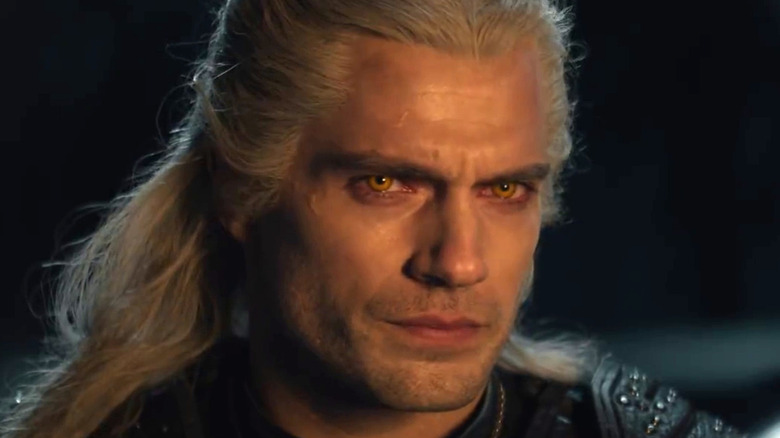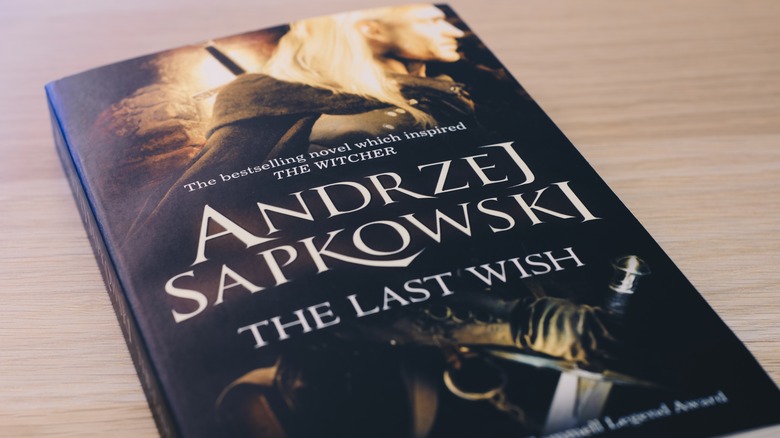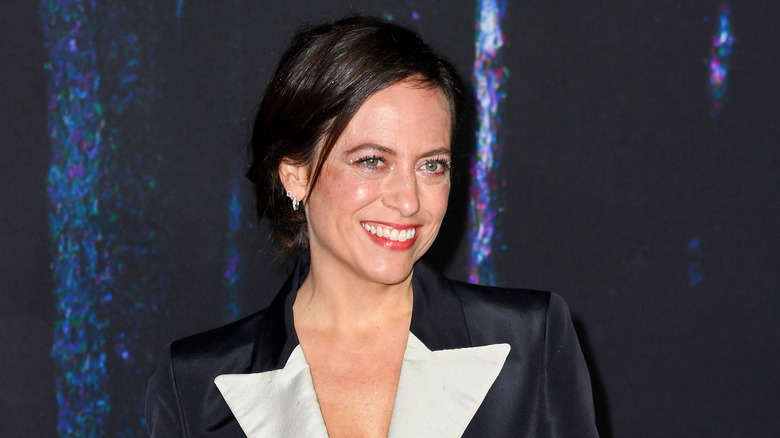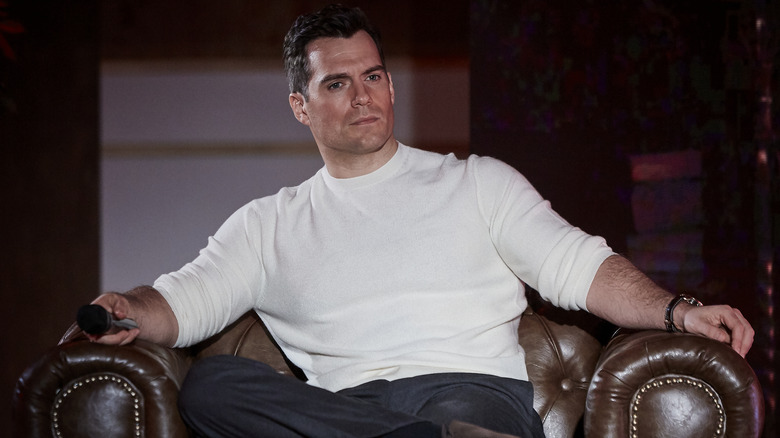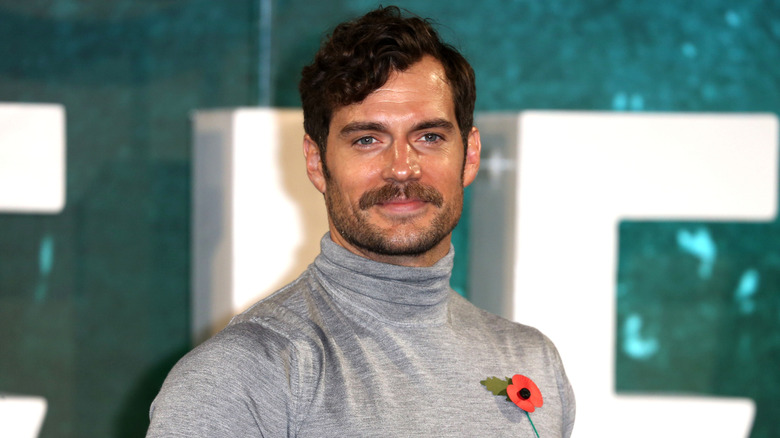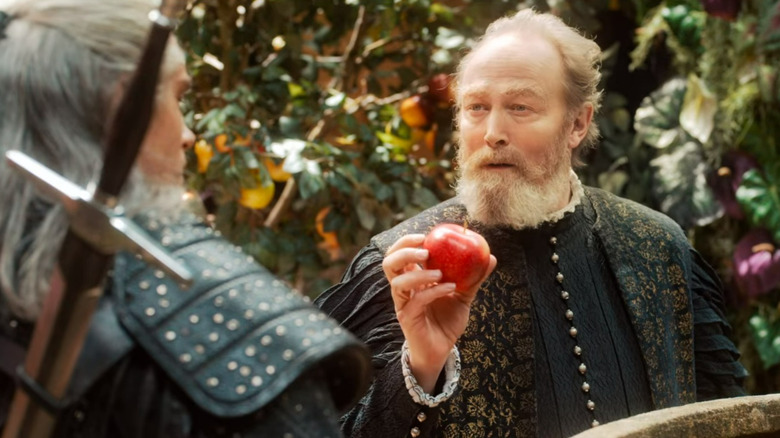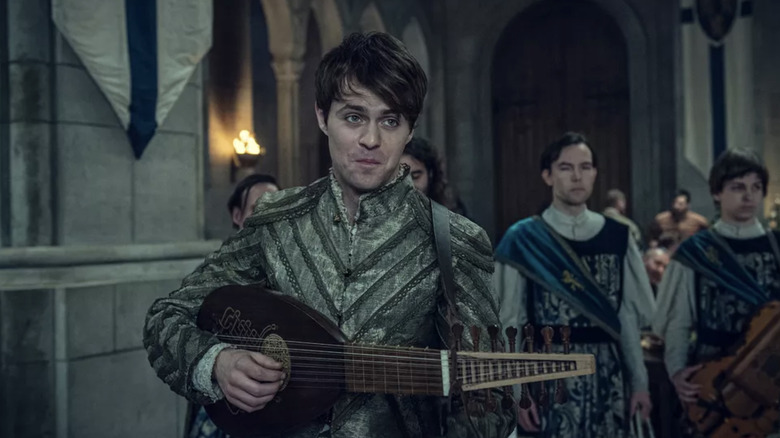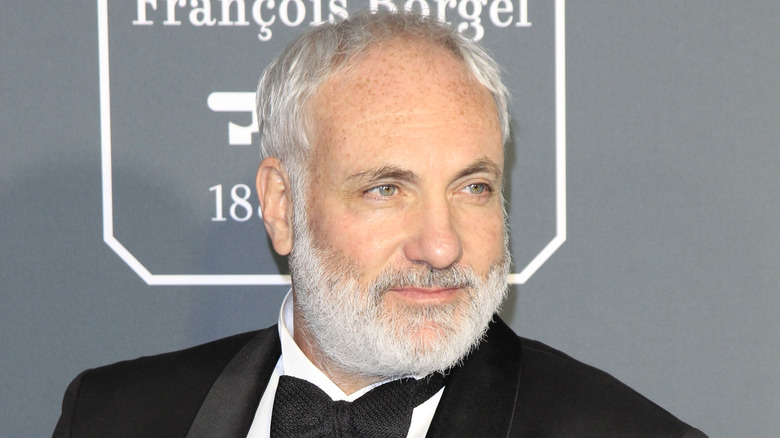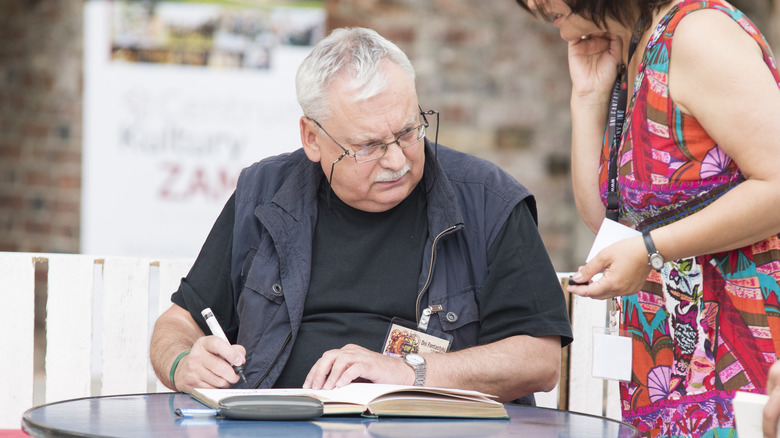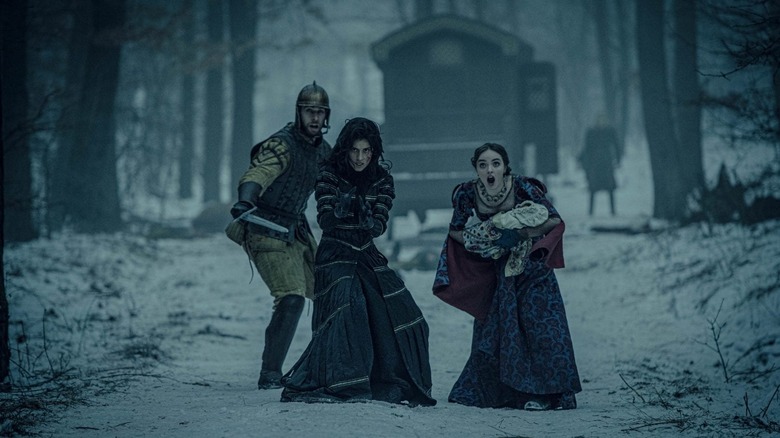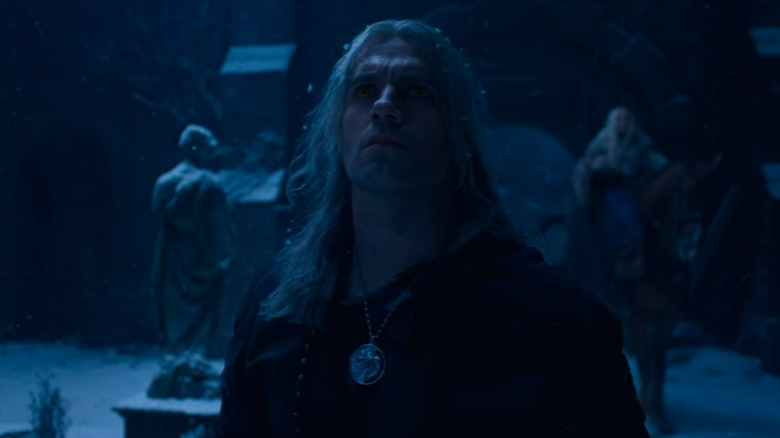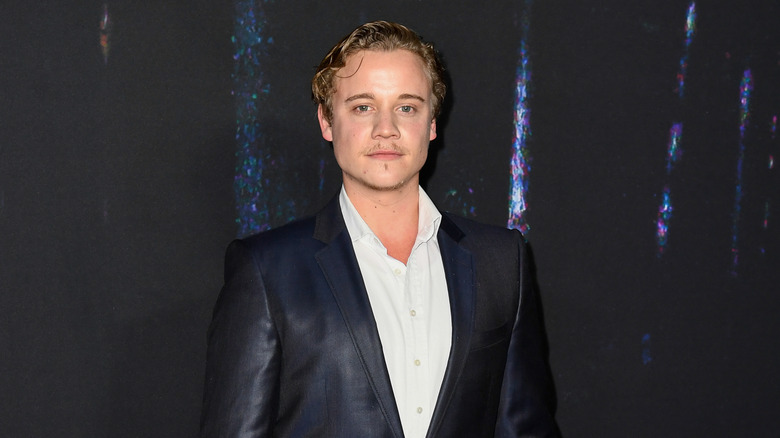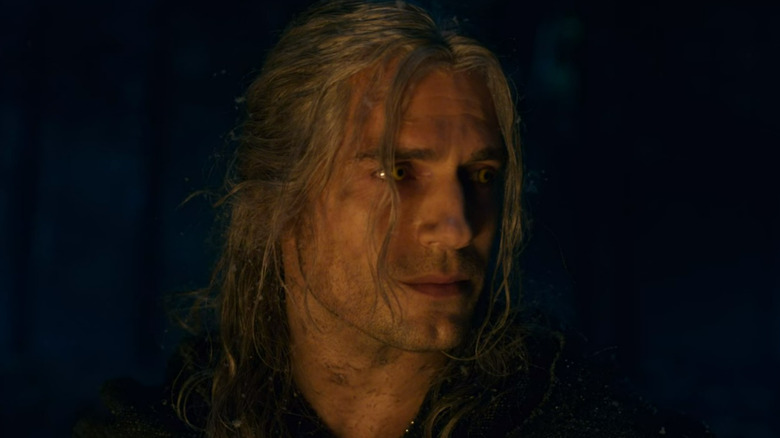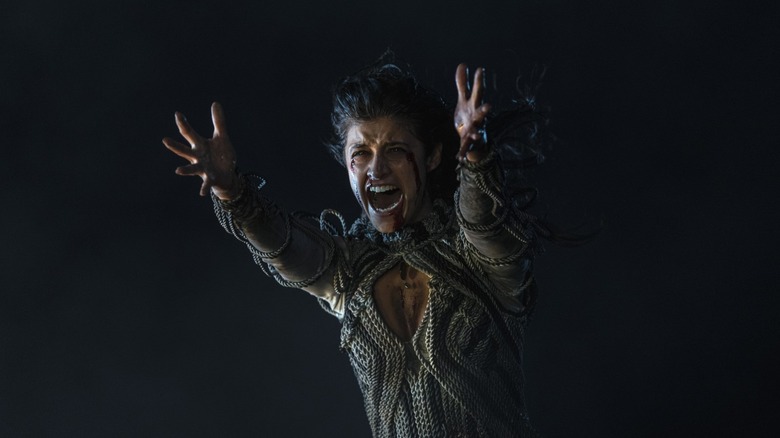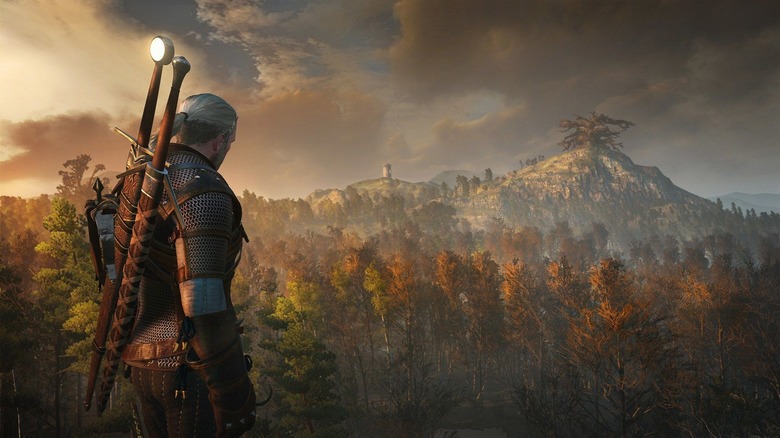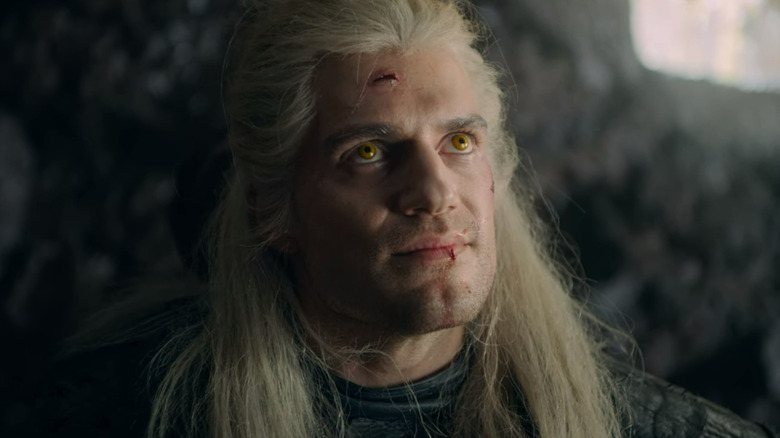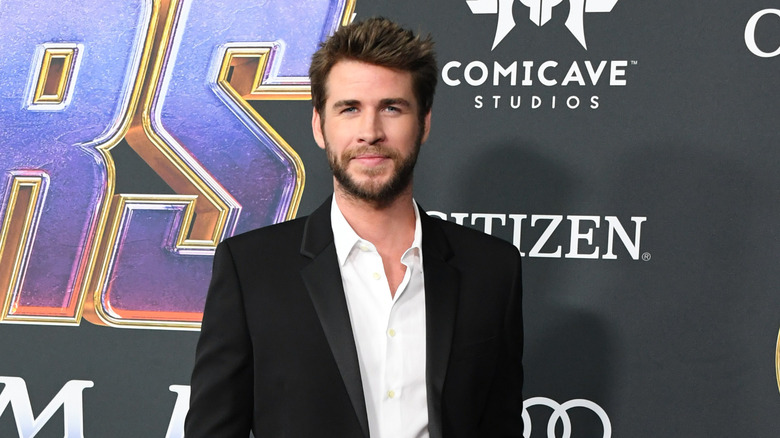The Untold Truth Of Netflix's The Witcher
After the conclusion of HBO's "Game of Thrones," fans of epic TV fantasy received another big-budget series in Netflix's "The Witcher." The show is based on the "Witcher" books by Polish author Andrzej Sapkowski and tells the story of three immensely powerful main characters — the eponymous Witcher Geralt (Henry Cavill), the sorceress Yennefer (Anya Chalotra), and the mysterious princess Ciri (Freya Allan), who find themselves at the center of a number of conflicts between kingdoms, monsters, and magical beings.
"The Witcher" franchise already had a highly dedicated fan base comprised of both hardcore gamers and fantasy fanatics, but that doesn't mean that the show's creators took its success as a given. From Henry Cavill pouring over the novels to find his favorite lines to the showrunner racking her brain to figure out the best way to tell the complicated story, a lot of thought and care went into the production of "The Witcher," which has proved to be more than just a CGI-filled fantasy spectacle. Here are some things about Netflix's "The Witcher" that you might not know.
The series is based on the novels, not the video games
Due to the massive popularity of CD Projekt RED's "The Witcher 3," many people were more familiar with the franchise's video game installments than with the original books when the Netflix series first premiered. In actuality, though, the games take place after the last chronological novel in the series, "The Lady of the Lake."
No matter how great the "Witcher" video games have been, they're almost completely separate from the source material according to Andrzej Sapkowski. "'The Witcher' is a well made video game, its success is well deserved and the creators deserve all the splendor and honor due," the author said in an interview with Eurogamer. "But in no way can it be considered to be an 'alternative version', nor a 'sequel' to the witcher Geralt stories. Because this can only be told by Geralt's creator. A certain Andrzej Sapkowski."
It was very important to series creator Lauren Schmidt Hissrich that the story of the Netflix show followed the original books as much as possible. "It's all in the books, so that stays our source material," She explained in an interview with TV Guide. "Obviously, it's an adaptation, so there are things that we have to change, there are characters that we can't meet, or characters that we must meet earlier in order to sort of set up the right dominoes. But we go back to the books again and again because it's all there." In short, the events of the "Witcher" games probably won't be adapted for Netflix anytime soon.
The Witcher's creator was inspired by Dunkirk
When Lauren Schmidt Hissrich became head of the "Witcher" series, one of her first dilemmas was figuring out how much time to devote to each of the main characters' storylines. Yennefer's detailed background spans 70 years, and the tale of Geralt is a more manageable 20 years, but Ciri's pivotal part in Season 1 lasts only a matter of weeks. To solve this issue, Hissrich was inspired by the approach director Christopher Nolan took when making the film "Dunkirk."
In an interview with TV Guide, Hissrich explained, "[Nolan] was talking about these three phases of getting soldiers off of this beach. And he had said, if I told them, like, let's say one phase took a month, one took a week, and one took a day — if I told them and let the month-long one take up the most story, and then the week-long one, and then the day-long one, you would think that the day-long one was the least important because it took the least amount of time on screen when in fact, all three phases were equally important, which is why he told the story that way." Hissrich used a similar method for Season 1 of "The Witcher." While this asymmetrical format may be confusing for some, it also allows the audience to fully get to know each of the protagonists before they all meet.
Henry Cavill is a huge Witcher fan
Of the three lead cast members in "The Witcher," Henry Cavill is by far the biggest fan of the source material. When Anya Chalotra and Freya Allan were asked by Fortress of Solitude who the best "Witcher" player is amongst the cast, they both quickly replied that it was Cavill without question. Allan then not only called him "a total nerd," but even went so far as to say, "He's like a Witcher bible on set. We'll be doing a scene and he'll be like, 'I think we should use this line from like page 253 from 'Blood of Elves,” and I'm like, 'How does this dude know all this stuff?'"
The lead star himself isn't shy about revealing his inner geek, especially when it concerns his love of the "Witcher" franchise. "I was very, very passionate about the games," Cavill said during a 2019 panel at San Diego Comic-Con (via Vulture). "I thought, 'I really hope they make this into a TV show or movie.'" Fortunately, his wish was granted.
207 other actors auditioned before Henry Cavill was cast
Henry Cavill wanted to play Geralt of Rivia so badly that right after "The Witcher" was announced by Netflix, the actor started badgering people to get his foot in the door. "As soon as it was announced it was going to be a show, he contacted his agents who contacted Netflix and said he wants to be part of this. And Netflix was like, 'We don't have a show yet, there's nothing to be a part of,'" Lauren Schmidt Hissrich revealed to Gizmodo. "Once I came on board, they expressed that to me, and I sat down and met [Cavill]. But I was really honest with him, and I said, 'It's really great to meet you, you seem like a nice guy. But we don't have a script, we're not even casting.' And he sat back and understood."
The future Geralt didn't give up, and he continued to press his people to keep reaching out while the screenplay was written. As part of a San Diego Comic-Con panel, Cavill explained, "It was something I wasn't going to let pass me by without giving it my best shot. I annoyed my agents all the time. They said, 'They're not ready'" (via Vulture).
Hissrich never forgot about Cavill, but she wanted to make sure that the right person was ultimately cast. Over a few months, 207 people auditioned for the role and none of them seemed to be a better fit. The showrunner then called Cavill to set up a reading, and when the two met back up in New York, the actor was hired (per Gizmodo).
Season 1 was filmed all over Eastern Europe
To depict the various fictional lands of "The Witcher," Netflix filmed at several locations, including the Canary Islands for the jungle scenes showing the Brokilon Forest of the dryads and the desert Yennefer sends Queen Kalis of Lyria to when trying to protect her (via Atlas of Wonders). However, most of the show was shot throughout Eastern Europe, especially in Hungary, Poland, and Austria. Many key spots in and around Budapest were used for several scenes showing places like the introductory town of Blaviken, the elaborate courtyard of the wizard Stregobor, and the grand hall of Cintra, the kingdom of Princess Ciri.
The studio also took advantage of tax incentives supplied by the Slovak Audiovisual Fund to film in Slovakia as well, according to Film New Europe. The formidable Fort Monostor on the Slovakian-Hungarian border was used to represent the impressive, fortified walls of Cintra.
Joey Batey played the lute for his audition
While Henry Cavill ended up being perfect for the role of Geralt, he may not have been as destined for the part as Joey Batey was for Jaskier. The talented performer is in a folk band called The Amazing Devil and already knew how to play the lute long before "The Witcher" was even announced.
However, Batey doesn't believe his casting was due to anything as grand as. In an interview with Wirtualna Polska, he explained, "I think it was a little bit of a coincidence. They were looking for Jaskier for quite some time and then my agents ran to me and said, 'you play the lute, right?' And I was like 'yeah?' And so I got there, went to the audition and brought a lute along and played a little song and they seemed to like it I guess. I don't know why, it was a terrible song."
Vesemir's actor lived in the forest for many years
Curiously enough, the life experiences of Kim Bodnia made him the ideal actor for his role as Vesemir, Geralt's mentor, in "The Witcher." The duo goes through a lot of challenging moments in the story, so it was important to Henry Cavill that Vesemir was played by someone who understood the true depth of the character, and Bodnia ended up checking every box. When the two were interviewed by PC Gamer, Bodnia recalled to Cavill, "I lived in the forest for twenty years, and when I was done telling you about my antics traveling and how it is to really be alone you said, 'You are Vesemir.'"
The respect was mutual, and both actors formed a strong connection while filming. Unfortunately, some of the scenes showing their close friendship never made it to the fans, as Cavill has admitted that not all of the filmed bromance between Geralt and Vesemir made it onto Netflix (per PC Gamer).
Andrzej Sapkowski has given his stamp of approval
There was a lot of pressure on Lauren Schmidt Hissrich and her team when "The Witcher" was in its early stages of development, given the high expectations of the large fan base. However, the showrunner was given some relief after meeting with Andrzej Sapkowski and getting to know him better. Hissrich went into it expecting at least some level of micromanagement over the project from the author, but she was surprised to find that wouldn't be the case.
When talking with TV Guide, the showrunner explained, "What [Sapkowski] wanted to do is taste the soup when it was finished. And to me, I mean even as a writer, I think it's such a great way to sort of say, 'I trust you and I trust your vision, and now I want to see what you do with it,' as opposed to micromanaging everything. And I think it's a great honor for me because I feel like he trusts what we're doing."
Not only did the author approve of the leadership of Hissrich to adapt his work for the screen, but Sapkowski was also vocal with his praise of the series after its release, especially concerning the performance of the lead star. The author told People, "I was more than happy with Henry Cavill's appearance as 'The Witcher.' He's a real professional. Just as Viggo Mortensen gave his face to Aragorn [in The Lord of the Rings], so Henry gave his to Geralt — and it shall be forever so."
The Witcher was the first major U.K. production shut down by COVID-19
The coronavirus pandemic that began in 2020 quickly impacted all major productions worldwide, but "The Witcher" happened to be the first TV drama to shut down in the U.K, according to Deadline. Like most people thought at the time, the pause in production was expected to only last a few weeks, but it turned out to be considerably longer. In an interview with Fortress of Solitude, Freya Allan explained how she was frustrated with the months-long break at first and then grew to appreciate it because she could return to the role with a fresh outlook.
Filming resumed in mid-August, yet later that year, COVID-19 caused the production to stop once again after multiple individuals tested positive while working on set. Fortunately, only four members of the cast and crew contracted the virus, and they were able to isolate in time so that production could resume around a week later.
Coronavirus restrictions limited filming to the U.K.
While Season 1 of "The Witcher" was filmed all over Europe, COVID-19 changed the plans dramatically for the following season. Instead of filming at exotic locales like the Canary Islands, the production was forced to remain entirely within the U.K. In total, 15 places were chosen throughout the country to replace the former spots, including Deepcut Surrey, Fountains Abbey, and Bourne Wood (per News & Star).
Sets were also constructed on the backlot of Arborfield Studios, not just for various village scenes, but also to depict one of the most important locations in the story — the Witcher stronghold of Kaer Morhen. As production designer Andrew Laws explained, "Kaer Morhen is a setting, but it's really like a character in season 2. We were also aware that it's an environment familiar to those who have read the books and played the video games, so we needed to honor that source material but also elevate it to a new level to keep it exciting for the audience. That was a great challenge, but also a responsibility that we took very seriously" (via News & Star). Despite these significant geographical restrictions, Netflix still managed to make the Continent look and feel fantastical in "The Witcher" Season 2.
Basil Eidenbenz wasn't supposed to play Eskel
For most of the cast and crew of "The Witcher," the coronavirus pandemic didn't cause any major production problems outside of the delays, as nearly everyone was able to return to work afterwards. Unfortunately, that wasn't the case for Danish actor Thue Ersted Rasmussen. Rasmussen was originally meant to play Eskel, a powerful Witcher, in Season 2, but COVID-19 disrupted his schedule to such an extent that he could no longer work on the project.
"Sadly, due to the rescheduling because of Covid-19, I will not be portraying Eskel in the Witcher. It's heartbreaking, of course, but I mostly feel happy and grateful for the days I got to spend on set earlier this year," Rasmussen wrote in a statement on Instagram. "I'm sure season 2 will be absolutely amazing and now I get to watch it as a fanboy instead of as a Witcher." Even though Rasmussen had filmed some scenes in February and March before the production was shut down, his inability to resume meant that he was completely replaced in Season 2 by Basil Eidenbenz.
Henry Cavill added some dialogue without permission
Being a huge fan of "The Witcher" himself, it makes sense that Henry Cavill would want to add his own input wherever possible to keep the series true to the source material. Normally, the actor would consult the showrunner, writers, or directors with any ideas beforehand, but on one occasion, Cavill took action all on his own.
There were some elegant lines written by Andrzej Sapkowski that Cavill thought would be great to include in the series. Speaking with Polish interviewer Marcin Zweirzchowski (translation via Redanian Intelligence), revealed the particular moment he wanted to add to the show. "There is a fragment right at the beginning of 'Blood of Elves' where Geralt loses consciousness on Sodden Hill. Geralt experiences a vision at the moment and talks to Death. Then, beautiful words are uttered about crossing the meadow and the fog," Cavill said. "There was no such scene in the series, and these words captivated me with their poetry. They were so wonderfully 'Sapkowski' that I wanted them to be spoken by my Geralt. However, I did not feel like having long discussion about whether I could add this bit somewhere. So I just did it, said the words in front of the camera, and was ready to face the consequences. Eventually, this issue hit the mark in season 2."
The moment brought up by Cavill actually occurs in Sapkowski's "Something More" originally, not "Blood of Elves," but the actor's dedication to the franchise certainly can't be questioned.
Fans and critics disagreed on The Witcher Season 1
"The Witcher" is a prime example of a show with wildly different critical and fan receptions. Whereas some films and series, like "Star Wars: The Last Jedi," are praised by critics and received less positively by fans, the Netflix fantasy epic had the opposite effect. Judy Berman of Time critiqued the convoluted structure of the story, and Entertainment Weekly called Season 1 straight-up "boring." While some other critics were more positive about the series from the start, the overall consensus was mixed at best. However, the same could not be said for the fan response.
On review aggregate sites like Rotten Tomatoes, "The Witcher" Season 1 received much higher marks from regular viewers than it did from the critics, reflecting a high level of satisfaction despite some flaws. The show also earned impressive viewership numbers the week of its initial premiere, surpassing even "The Mandalorian" on Disney+ (per Business Insider).
The Netflix show caused sales of the video games to skyrocket
If it weren't for the huge success of "The Witcher 3: Wild Hunt," the Netflix series may never have even made its way to production. The video game is one of the biggest of the modern era, and it helped bring Andrzej Sapkopwski's fantasy franchise to a much wider audience (per Polygon). Fortunately, the show has turned out to be quite the hit as well, which has allowed it to return the favor.
After the series was made available for streaming in December of 2019, sales of "The Witcher 3" went up by 554% for physical discs on all gaming platforms when compared to the previous year, according to PC Gamer. The third installment in the series wasn't the only one to receive more love either, as both the first and second games increased substantially in popularity as well.
Some writers strongly disliked the source material
Following the release of Season 1 of "The Witcher," showrunner Lauren Schmidt Hissrich admitted in a Twitter thread Q&A that she sought out writers who were familiar with the original books, but not completely devoted to the source material. Basically, an open mind was essential to creating an adaptation that was their own.
Given the showrunner's approach, it may not be surprising to learn that a small number of the creative team weren't the biggest fans of author Andrzej Sapkowski's work at first. However, it was shocking when Beau DeMayo, a writer and co-producer of "The Witcher" from 2019 to 2021, revealed the extent of the negative feelings some of the creators had for the novel series.
As DeMayo was talking about his involvement with the upcoming Marvel animated series "X-Men '97" in a Q&A session on Instagram, he brought up the Netflix fantasy show to emphasize the importance of working with true fans when creating adaptations. He wrote, "I've been on a show — namely 'Witcher' — where some of the writers were not or actively disliked the books and games (even actively mocking the source material.) It's a recipe for disaster and bad morale. Fandom as a litmus test checks egos, and makes all the long nights worth it. You have to respect the work before you're allowed to add to its legacy" (via The Direct).
Liam Hemsworth replaces Henry Cavill as Geralt
At the end of October 2022, fans of "The Witcher" were initially delighted to hear that Netflix had renewed the show for a Season 4 prior to the release of Season 3. A good number of them may have been quickly dismayed, however, when they learned that Henry Cavill would no longer be in the picture. It was announced that the actor would be stepping down from his role as Geralt of Rivia after Season 3, with Liam Hemsworth selected to take his place (all per Netflix Tudum).
A specific reason wasn't given for Cavill's departure, but there's been much speculation. In 2021, Cavill — a diehard fan of the "Witcher" books — gave an interview with The Philippine Star that hinted at creative tension behind the scenes. "The toughest part for me was finding that balance between the showrunners' vision and my love for the books, and trying to bring that Geralt to the showrunners' vision," he said. "It's about treading a fine line there. It's the showrunners' story and so it's an adaptation."
It's possible that creative differences played a role in Cavill's departure, but it's also likely that his busy Hollywood schedule is the real reason. Deadline reported that the actor had signed a "short-term deal" to star in the show and "felt it was time to move on after three seasons," according to sources. With Cavill returning to the DCEU as Superman, he'll certainly be busy. Both actors spoke about the other with great respect in public statements about the transition.
